

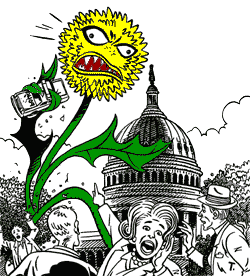 |
Introduction
Fourteen members of Congress from California are cosponsors of a bill written by pesticide industry lobbyists that would block a landmark federal law to protect children from the health risks of toxic pesticides. Although these members claim their opposition to the Food Quality Protection Act (FQPA) is based on a concern for "sound science" in pesticide regulation, most of them show no such concern about allowing poorly tested chemicals to be used on children’s food, according to analysis of federal records by the Environmental Working Group (EWG).
Since the passage of the FQPA in 1996 by a unanimous vote of Congress, 10 representatives from California who cosponsor the pesticide industry's bill have also lobbied the U.S. Environmental Protection Agency for so-called "emergency" or "crisis" exemptions that allow the use of pesticides that are not registered for that use because their health effects have not been fully tested – a practice that has turned the Section 18 exemption program into a routine escape hatch for pesticide companies or growers who don’t want to comply with the tougher standards required by FQPA. In that same period, those 10 California representatives have taken $170,000 in campaign contributions from pesticide and agricultural interests trying to stop the implementation of the Act. (Table 1.)
Table 1. Members of Congress from California who support legislation
to block children's pesticide safety standards and have pushed for
'emergency' exemptions for inadaquately tested pesticides.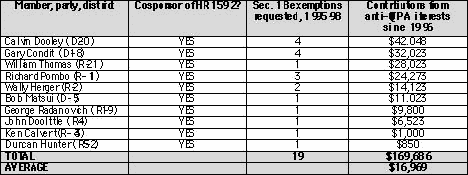
Source: Environmental Working
Group. Compiled from U.S. EPA Section 18 records.
The anti-FQPA bill is HR 1592, The Regulatory Fairness and Openness Act of 1999, which is being carried by Rep. Richard Pombo, R-Stockton. Citing the need for "sound science" in setting pesticide regulations, HR 1592 would require the EPA to slog through a time-consuming bureaucratic morass before taking regulatory action against a pesticide – regardless of the preponderance of the evidence that the pesticide is unsafe for children.
'Sound science' is just a sound bite
The legislation supported by these 10 members of Congress would effectively stop EPA from restricting pesticides to protect children, supposedly out of concern that "sound science" does not support the overwhelming evidence that children are more susceptible to the health effects of toxic pesticides than adults. FQPA requires for the first time that pesticide safety standards provide an additional tenfold margin of safety for children, and also that the health risks of similar pesticides be evaluated for their cumulative effect, not separately.
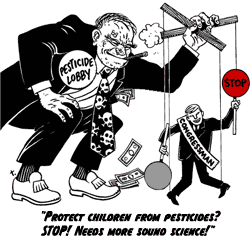 |
|
| For some
California members of Congress, sound science is nothing more
than a sound bite. |
HR 1952 or its Senate counterpart, S 1464, currently have a total of 225 cosponsors -- 53 of whom have also lobbied EPA for Section 18 exemptions. Apparently, for these lawmakers "sound science" is just a sound bite to cover opposition to environmental safeguards that the pesticide industry opposes, because they don’t show the same concern for science when it comes to putting untested pesticides in the food supply.
Each of them has actively lobbied EPA to grant section 18 exemptions for pesticides, often for use on children’s foods, even though by definition Section 18 pesticides lack a complete base of scientific evidence supporting their safety. Since 1996, the 10 members from California have written the EPA 19 times to request Section 18 exemptions for eight different pesticides used on six different crops. (Table 2.)
Table 2. Ten California congressmen who cosponsor anti-FQPA
legislation have also written EPA to request 'emergency' exemptions for
one or more poorly tested pesticides.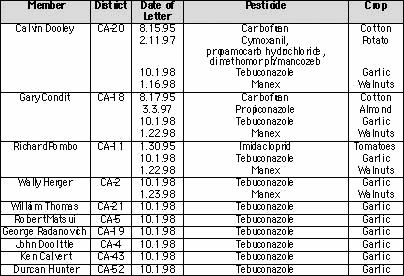
Source: Environmental Working
Group. Compiled from U.S. EPA Section 18 records.
The legislation they co-sponsor would further weaken the rules governing Section 18 exemptions, even though Section 18 pesticides are already being used without the most rudimentary requirement of sound science: a complete, thoroughly reviewed set of health and safety data. Under HR 1952, Section 18 exemptions could be granted without even the most cursory assessment of the risk to children. These members of Congress are putting children at risk by supporting easier access to exemptions from children’s health standards under Section 18, while working to block children’s health protections under FQPA.
The influence of money
Members of Congress who cosponsor HR 1952 or S 1464 and who have written EPA in support of Section 18 exemptions for growers in their states received significantly greater amounts of money from the pesticide interests who drafted the bill, compared to members of Congress who are neither cosponsors nor Section 18 advocates. During the last two election cycles, those representatives received an average of $10,301 from members of the so-called Implementation Working Group, a coalition of pesticide and agribusiness PACs whose staff drafted Pombo’s bill. (The 10 Californians received an average of $13,175.) In that same period, members of Congress who supported neither the bill nor Section 18 exemptions received an average of $2,693 from IWG PACs.
Of the 15 Congressional or Senate cosponsors and Section 18 advocates who took the most money from IWG, six are from California. (Table 3.) Their districts form an unbroken line through the heart of the Central Valley, and their political affiliations - three Democrats and three Republicans - demonstrate that in the state’s farm belt, both major parties are under the sway of the pervasive influence of big agriculture. They also show how a handful of members of Congress from one area of the country dominated by agribusiness have a disproportionate influence on U.S. pesticide policy.
Table 3. Top recipients of campaign contributions from anti-FQPA
PACs by members of Congress who co-sponsor HR 1952 or S 1464 and have
lobbied EPA for 'emergency' pesticide exemptions.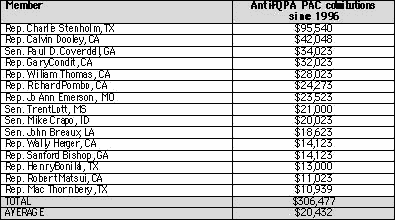
Source: Environmental Working
Group. Compiled from U.S. EPA Section 18 records.
‘Emergency’ exemptions are increasing
Section 18 of the Federal Insecticide Fungicide and Rodenticide Act (FIFRA) allows EPA to grant emergency and crisis exemptions from pesticide health and safety standards for farmers facing sudden and potentially catastrophic pest infestations. A Section 18 exemption allows the temporary use of a pesticide that has not been proven safe for use under normal circumstances. The program is fraught with abuses, and according to two reports by the Congressional General Accounting Office (GAO), too often serves as a regulatory shortcut for the pesticide industry, as opposed to meeting the legitimate needs of farmers
Many so-called Section 18 emergencies are not emergencies at all, but indeed are routine, annual pesticide infestations. Growers and pesticide companies are using the exemption process as a way to avoid the tough children’s health protection requirements of FQPA. The best example of this is the surge in emergency and crisis exemptions for the use of untested pesticides to control weeds. Crisis exemptions for weeds increased by 70 percent after the passage of FQPA. In 1998, nearly one fifth of all "crisis" exemptions nationwide were for weeds.
Recommendations
To close the Section 18 loophole without denying farmers legitimate emergency exemptions, EPA must:
- Develop core minimum health and safety data requirements for
pesticides granted Section 18 exemptions. FQPA requires an affirmative
finding that Section 18 exemption are safe for infants and children. EPA
cannot make this finding without a core set of health and safety studies
on the pesticides receiving the exemptions; including, at a minimum,
studies on acute, subchronic and chronic toxicity, developmental and
reproductive toxicity, carcinogenicity, developmental neurotoxicity,
metabolism and residues levels on treated crops.
- Require manufacturers to monitor residue levels of Section 18
compounds on treated food, particularly children’s food. Many of the
pesticides receiving Section 18 exemptions are based on sophisticated
chemistry that is not detectable by FDA’s commonly used analytical
methods. Indeed, the FDA has never tested any food for a handful of
Section 18 compounds that EWG examined. The government cannot guarantee
the safety of children in the absence of inspections.
- Stop approving the same emergency exemptions year after year. EPA
regulations require that exemptions be denied after three consecutive
years if a company is not making progress toward registration of the
pesticide. Every manufacturer granted a Section 18 exemption for two
years should know the third year will be denied without the studies
needed to secure full registration.
- Crack down on states’ frequent use of exemptions. The EPA should
audit the states’ exemption evaluation processes and revoke authority to
certify "emergencies" and "crises" if that state files exemptions for
situations that don’t truly threaten farmers.
- Apply the additional FQPA children’s tenfold safety factor to all Section 18 tolerances. By definition Section 18 pesticide uses lack the data required to make a determination of safety to infants and children, and thus must receive the additional tenfold factor required by law.
